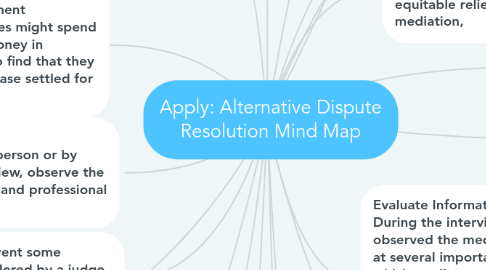Apply: Alternative Dispute Resolution Mind Map
by farzeena khan

1. The standards used by an arbitrator are not clear, although generally the arbitrator is required to follow the law
2. Rules of evidence may prevent some evidence from being considered by a judge or a jury, but an arbitrator may consider that evidence.
3. If arbitration is binding, both sides give up their right to an appeal.
4. he dispute will normally be resolved much sooner, as a date for the arbitration can usually be obtained a lot faster than a court date.
4.1. Arbitration is usually a lot less expensive. Partly that is because the fee paid the arbitrator is a lot less than the expense of paying expert witnesses to come and testify at trial
5. The parties to the dispute usually agree on the arbitrator, so the arbitrator will be someone that both sides have confidence will be impartial and fair.
6. Mediation lacks the procedural and constitutional protections guaranteed by the federal and state courts. T
7. Interview the Mediators. Talk to the mediators in person or by phone. During the interview, observe the mediator's interpersonal and professional skills
8. Word of Mouth. Ask a friend, your attorney, your therapist, or another professional.
9. Word of Mouth. Ask a friend, your attorney, your therapist, or another professional.
10. Mediation has no formal discovery process. If one of the parties to a dispute cannot fully address the case without first receiving information from the other party
11. Mediation does not always result in a settlement agreement. Parties might spend their time and money in mediation only to find that they must have their case settled for them by a court
12. Decide What You Want from Mediation Think about your goals for the session. Do you want a mediator who suggests options in order to help move the parties towards agreement?
13. Mediation is relatively swift.
14. ediation allows for flexible solutions and settlements. The relief available in court is usually based on pecuniary damages, and equitable relief is hard to come by. In mediation,
15. Mediation is relatively simple
16. Mediation allows the parties to revise and adjust the scope of their conflict. In a trial, initial pleadings and rules of procedure limit the issues which a party can raise.
17. Evaluate Information and Make Decision. During the interviews, you probably observed the mediators' skills and abilities at several important tasks. These tasks, which mediators perform in almost all mediations, include: gathering background information, communicating with the parties and helping the parties communicate,
18. Mediation can be a problem if one or both parties are withholding information
19. Settlements reached in mediation are more agreeable to both parties than court judgments.
20. Mediation is relatively inexpensive


